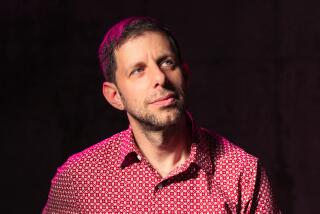Something New, and Mesmerizing, to Say
Iconoclastic composer Robert Ashley has a fiendish way with words. His experimental operas are densely packed with them, snatched from high and low culture and set into tightly choreographed blends of speech, song, meaning and textural wizardry. Starting with his epic 1980s âtelevision operaâ project âPerfect Lives,â Ashley has been creating hypnotic, James Joyce-like maximalist works, which seem like studies in free association but are more structure-conscious than they let on.
Language appears in a virtuosic flood in the 1994 âForeign Experiences,â a duet version of which was given its West Coast premiere Friday by Ashley colleagues Jacqueline Humbert and Sam Ashley (the composerâs son). It took place in the hip Salvation Theater in Silver Lake, before a full--if tiny--house, as part of a music series called âVocal Lounge.â Sparseness of set and setting added to the compacted intensity here, as the two principals stood onstage, in bare feet and trench coats, and offered a tour de force performance.
Ashleyâs work--which has been a huge influence on Laurie Anderson and Spalding Gray, to name a couple of his better-known fans--has been accorded critical praise, a cult following and commissions in Europe, but he remains underappreciated, perhaps because his ideas are ahead of, or at least outside of, their time.
âForeign Experiencesâ is one of four operas in the cycle âNow Eleanorâs Idea,â from which two others, âImprovementâ and âeL/Aficionado,â were performed at CalArts in 1993, with an ensemble including baritone Thomas Buckner and Robert Ashley himself.
As heard in Silver Lake, âForeign Experiencesâ unfolds in a 72-minute thicket of language and allusion. Itâs unforgettable, verging on the mystical. True to the Ashley code, plot is a deliberately evasive thing. This much we know: Don (Sam Ashley) has been drawn into unfamiliar, paranormal realms after taking a course in premonitions. Linda (Humbert) interacts with and advises Don along his confused path toward enlightenment.
Off this loose premise, the composer spins his abstract yarn in thick layers. Along the way are aspects of pulp-fiction patter, film noir-ish intrigue, psychedelic recitative, expletive-adorned rants and aesthetic observations, all part of Ashleyâs wild theatrical tapestry.
The score is delivered in a constantly shifting style, often with the singers navigating the composerâs tricky verbal rhythms, venturing off into whirlwind solos or interrupting each other.
At the Salvation, their vocals were subtly colored by live electronic treatments by David Rosenboom and their bodies graced with occasional light flashes controlled by Julie Adler.
Electronic musical backdrops generally behaved as sonic scenery rather than integral material. Sonic character varied among the four acts, from distracted dissonances in Act I, rhythmic drive in Act II (including a quasi-soul song moment) and the climactic outpouring of Act IV, and ethereal octaves in Act III.
In the end, âForeign Experiencesâ may touch on the foreign experience of language itself. The mesmeric blur of its libretto both celebrates language and questions its basic hold on truth or rational thought.
Ashleyâs ultimate message may be that the language of music strikes deepest.
More to Read
The biggest entertainment stories
Get our big stories about Hollywood, film, television, music, arts, culture and more right in your inbox as soon as they publish.
You may occasionally receive promotional content from the Los Angeles Times.










